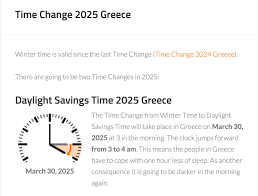Understanding the Clock Change in 2025

The Importance of Clock Changes
Every year, millions of people across the United Kingdom adjust their clocks in accordance with Daylight Saving Time (DST), a practice that has been in place for decades. The clock change in 2025 will bring renewed discussions around the benefits and drawbacks of this time transition.
What is the Clock Change?
The clock change typically occurs on the last Sunday in March, when clocks are set forward one hour at 1 AM, and on the last Sunday in October, when they are set back one hour at 2 AM. In 2025, the forward change will take place on March 30. This shift aims to make better use of daylight during the longer days of summer.
Recent Developments and Discussions
In recent years, there have been ongoing debates regarding the necessity of the clock change. Proponents argue that it helps to utilise natural daylight, reduce energy consumption, and promote outdoor activities in the evening. Conversely, critics highlight the disruption it causes to sleep patterns and its potential negative health impacts. These discussions have prompted various parliamentary inquiries and public consultations aimed at evaluating the potential for abolishing the clock change altogether.
Public Opinion and Legislative Action
According to a recent survey conducted by Time to Change, a significant portion of the UK population is in favour of scrapping the clock change. In response to these sentiments, UK lawmakers have been presented with proposals to assess the impact of maintaining a consistent time year-round. The final decision on any legislative changes regarding clock change practices is likely to emerge from these continued discussions in 2025.
Conclusion and Recommendations
The clock change in 2025 is not merely a matter of adjusting clocks; it encapsulates important conversations about lifestyle, energy efficiency, and health. As society grapples with the implications of this seasonal shift, it is essential for individuals and communities to stay informed and engaged with these developments. Whether the UK maintains its clock-changing tradition or moves towards a permanent time solution, these discussions will significantly influence the daily routines and schedules for many in the years to come.









